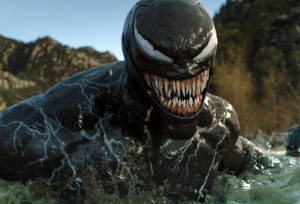
The post Monday Movie: The Deep Blue Sea, by David Bax appeared first on Battleship Pretension.
Every Monday, we’ll highlight a piece of writing from our vaults. This review of The Deep Blue Sea originally ran as as a theatrical review.
Terence Davies and Rachel Weisz, the director and star, respectively, of the new film The Deep Blue Sea have relished, in doing press for the film, relating the fact that Davies had never even heard of Weisz until he happened to see a bit of her 1997 film Swept from the Sea on television and just knew he had to have her for the role of Hester Collyer. Apart from the news that Rachel Weisz is apparently the most famous woman in the world now and it’s shocking that anyone at all hasn’t heard of her, this implication of Davies’ remove from modernity won’t carry any surprises for those who have actually watched The Deep Blue Sea. Other than its being packed with contemporary star wattage like Weisz’s, this is a film that could have been made in the post-World War II years in which it is set.
Weisz’s Hester is a woman who has left her very rich judge of a husband, William (Simon Russell Beale, fantastic), for a rakish and energetic former RAF pilot named Freddie (Tom Hiddleston, continuing his hot streak). The former kept her bored in luxury while the latter keeps her helplessly infatuated in a life filled with pints and singing in romantic proximity to true poverty. She has no doubts about the decision she has made and she obviously, both in words and in deeds, loves Freddie far more than she does William. Yet the film begins with Hester attempting suicide. What follows is the story, mostly told in lengthy flashback, of a woman who has knowingly allowed her heart to lead her into ever more dire circumstances.
Davies adapted his film from Terence Rattigan’s 1952 play of the same name. Reportedly, he removed a hefty amount of dialog, resulting in the long, seeping silences that adorn and color the finished product. Not being familiar with the play (nor its 1955 British film adaptation with Vivien Leigh in the lead role), I can’t but wonder if he also altered the film’s themes. Was Rattigan’s tale as clear a metaphor for post-war Britain as Davies makes it seem? Or was the playwright simply too close to the world he was writing about to make that explicit? In any case, it’s there in this new film. Hester is led to ruin by clinging unyieldingly to Freddie, whose inability to mature beyond his young flyboy persona marks him as representative of more exciting times. Hester could improve her lot in life by making amends with her dour but practical husband; in essence, she could make the best of what she has instead of letting Freddie’s obstreperousness drag her down into the depths. Despite his financial wealth, the emotional destitution of their marriage represents the sobering realities of Britain’s post-war economic decline. Hester may be damning herself by cleaving to the past but at least she’s having more fun.
Similarly, even though Davies is bringing us along on a journey to hell, we’re traveling in great style. The slightly hazy photography makes everything beyond a certain point cloud together and seem to fall away, giving us the impression of being in a warm , protective bubble even when we very much are not. Freddie and Hester’s apartment is so meticulously art-directed and feels so comfortable and lived-in that not only do you feel as if you’re actually standing there among the creaking furniture and fraying curtains, you want to be.
Davies’ best asset, though, is his cast. I’ve already mentioned Beale, who is not afraid to make you understand why Hester doesn’t love William but is able to give him dignity at all times. And I’ve remarked on Hiddleston, who portrays a man possessed of a most charming surface under which lies an alarming immaturity. But this is Weisz’s film more than anyone else in the cast and she is quietly wonderful. Hester is potentially a difficult character to like. She’s cruel to William at times, allows Freddie to walk all over her at others and consistently makes foolish decisions. By looking into Weisz’s eyes, however, you can see and understand all that she is and even support her choices.
To be more accurate, I should say you support her eventually. The film takes a half an hour or so to get up to speed. The early sequences, including the suicide attempt, are too slow and with too little insight. Hiddleston’s introduction, as well, is problematic. There is dialog that is painful in its obviousness, establishing his military history. A second viewing may reveal to me that this is all by design but it did take me a while to get into this film. Yet, I was so far into by the end that I scarcely remembered why I hadn’t been.
We almost never see films that are this unequivocally earnest anymore. Frankly, I’m not sure most moviegoers are prepared for it. Perhaps that’s why I was slow to like it. Maybe the film had to wear down my ironic defenses. I left the theater a bit puzzled but smiling, knowing that The Deep Blue Sea was like nothing I’d seen before and that I would someday soon be watching it again.
The post Monday Movie: The Deep Blue Sea, by David Bax first appeared on Battleship Pretension.
The post Monday Movie: The Deep Blue Sea, by David Bax appeared first on Battleship Pretension.









